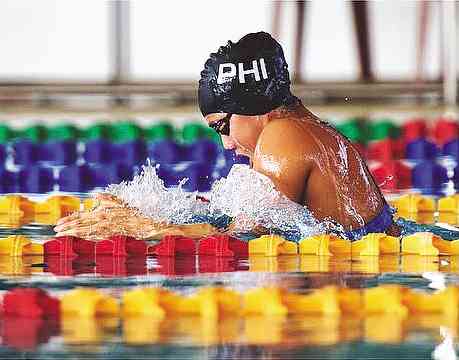
Raissa Gavino’s Olympic dream is still alive despite failing to bag a gold in the Southeast Asian meet. —PINOYSWIMMING.COM
Don’t get teenager Raissa Gavino wrong if she tells you she has already drawn up a personal road map to the swimming competition of the 2020 Tokyo Olympics.
“I have it all planned in my head,” says Gavino, a 16-year-old junior high school swim scholar at British International School in Phuket, Thailand. “To achieve my goal, I have to take it one competition at a time.”
Gavino plans to compete in several important tournaments in her buildup to the biggest sports gathering on the planet. As the holder of national junior records in the 50-meter (33.56 seconds), 100m (1:13.14) and 200m (2:36.55) breaststroke events, she commands attention from a national federation desperate to develop talents who can show they are the best in the continent, or at least in Southeast Asia.
The daughter of former national rowers Maria Rowena Gavino and Jose Romeo Gavino, Raissa is a pillar of the national junior team, like Rafael Barreto, a 10th grader from Ateneo, and Maurice Sacho Ilustre, a multiple gold medalist in the Palarong Pambansa.
Barreto shares Gavino’s Tokyo aspirations. For a young swimmer increasingly obsessed with quicker clockings as his competition maturity grows, Barreto has the correct frame of mind to chase his dreams. For every second he lops off from his personal best, the 16-year-old says he moves closer to a cherished Olympic stint.
“That’s my dream, and I’m aware of the hard work that I need to put in to accomplish it,” says Barreto, who is being groomed to compete in the Kuala Lumpur SEA Games next year.
But if the country’s performance in the recent Southeast Asian Age Group Swimming Championships is any indication, the local sport may still be in deep water. As it is, Gavino, Barreto and Ilustre may have to put in more effort to stay the course.
Still smarting from a disgraceful gold-medal shutout in the 2015 SEA Games in Singapore, Philippine swimming has remained moribund, torn by a leadership imbroglio, according to critics, and cursed by a dearth of prodigious talents in sufficient numbers.
Gavino, Barreto, Ilustre and 37 other swimmers sent by Philippine Swimming, Inc. (PSI) to the competition in Bangkok scooped up a single gold medal, 10 silvers and 11 bronzes and wound up sixth overall in a field of nine countries.
Vietnam, the region’s emerging pool powerhouse, gave the Philippine contingent a reality check. Long overshadowed by swimmers from Singapore, Indonesia and Thailand, the Vietnamese put together an amazing performance by carting away 39 gold, 39 silver and 27 bronze medals to rule the competition. Indonesia came next with a 24-17-17 count and Singapore placed third with 18-15-21.
Ilustre and young Filipino-Australian mermaid Bhay Maitland Newberry accounted for the country’s finest showings in the meet with Ilustre surpassing a Southeast Asian age-group record and Newberry salvaging the Philippines’ lone gold medal.
Ilustre bagged the silver in the boys’ 16-18 200m butterfly in 2:03.31, a clip second only to the 2:01.46 of Vietnam’s Nguyen Huy Hoang. Both clockings toppled the old 2:04.04 record.
Newberry ruled the girls’ 13-under 100m breaststroke and seized the silver in the 200m breaststroke in 2:28.69—surpassing the 10-year-old record of 2:29.10 held by Dorothy Grace Hong, as well as in the 50m and 200m backstroke. Newberry also reset the national marks in the 100m (1:08.10) and 200m (2:28.69) backstroke while scooping up a bronze in the 50m free.
Miranda Cristina Renner, a Filipino-American based in Paris, tied Newberry for the most number of medals with four by clinching three silvers in the girls’ 14-15 50m breaststroke and 50m and 100m freestyle, and a bronze in the 100m breaststroke.
Gavino picked up a pair of silvers in the 100m and 200m breaststroke in the 14-15 bracket while Barreto won two bronzes in the 50m and 100m butterfly.
Renner reset the national records in the 14-15 class in the 50m free (26.88) and 100m free (59.82) while Christian Sy rewrote the junior mark in the 100m back (1:01.71) in the boys’ 14-15 age group.
The other swimmers who posted podium finishes were Akiva Jose Carino and Nicole Meah Pamintuan in the 16-18 age bracket, Phillip Joaquin Santos and Xandi Chua in the 14-15 group and 13-under standout Camille Lauren Buico.
Chua and Buico also won two medals each. Chua pocketed a silver in the 200m back and a bronze in the 400m IM while Buico won the silver in the 50m fly and the bronze in the 100m fly.
Still, PSI officials are happy with the modest achievements of the junior swimmers, 30 of whom of are part of its developmental pool. Secretary general Lani Velasco says the meet gauged the swimmers’ readiness to compete in competitions such as the SEA Games.
“We’re committed to elevating Philippine swimming not only in the Southeast Asian region but also in the international arenas as well,” says Velasco. “We’re moving in the right direction. This is a process that requires the collective efforts of the athletes, coaches, parents and the government.”
To achieve parity with highly progressive swimming programs in the region, the PSI brought in world-renowned high-performance coach Wayne Goldsmith last year to teach coaches and swimmers the physical, mental, technical and strategic elements of effective swimming agendas.
The federation’s G-League Short and Long Courses meets give swimmers across the country a venue to experience high-caliber competition, a must for the PSI if it hopes to discover more talents in the mold of SEA Games multiple gold medalists Eric Buhain and Miguel Molina.
With the Kuala Lumpur SEA Games just eight months away, it would behoove the PSI to step up in order to bury the nightmare of Singapore 2015.

